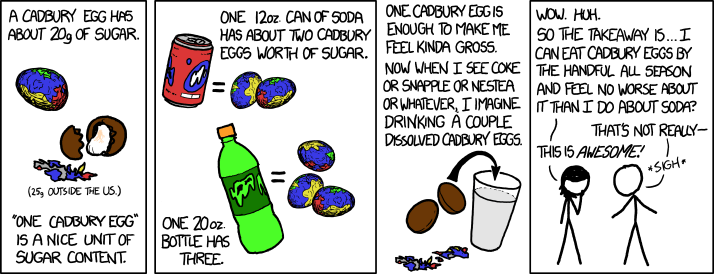
How many people have made a serious effort to quit sugar for a month? How many have succeeded? It has been said that trying to quit sugar for a month will make a skeptic into a food-addiction believer. That is, if the person gets through the preliminary research to try and figure out what does not have sugar in it.
At My Addiction.com, more than 30 possible addictions are listed, and sugar addiction has its own category, not even in with the rest of the food disorders.
One school of thought holds that the substance of choice is barely even relevant to the development and treatment of addiction. In other words, an addiction-prone person will find something to be addicted to, and often it’s only a matter of what substance gets there first. That’s why there is cross-heritability, the tendency of a person in recovery from one addiction to pick up a different one.
Increasingly, for human babies, the substance that gets there first is sugar. Some Americans have even come to realize that sugar is the “ultimate gateway drug,” like Carl S. Milsted, Jr., who speaks of:
[…] the epidemic of soft drugs, those respectable drugs commonly ingested multiple times a day, drugs routinely pushed onto our children. I’m referring, of course, to drug-like foods: chocolate, caffeine, sugar, high fructose corn sweeteners, dyes, artificial flavors, charred meats, toasted cereals, fine ground flours, deep fried crunchies, and partially hydrogenated vegetable oils.
Highly processed foods are recreational drugs; treat them with respect accordingly.
But then he goes on to say:
A single glass of wine in the evening provides a sufficient buzz if you are relaxed to start with. A single cup of coffee provides rocket power — if you have been caffeine free for several days. A couple of fresh homemade chocolate chip cookies — with real sugar, butter and vanilla — provide more pleasure than an entire bag of store bought cookies.
All true, for a usually abstemious, non-addicted person. But moderation has been proven not to work for addicts. Recovering alcoholics don’t get to have the occasional glass of wine. They get no glasses of wine. Because the nature of addiction is, borrowing an automotive metaphor, to go from 0 to 60 miles per hour in four seconds. Just a little bit of accidentally ingested alcohol can send a person on a binge, and they may never see Day 1 of sobriety again. This is why it’s so hard for people to quit sugar, which is everywhere, hidden in the most unexpected foods.
Of course, sugar is mainly in the places where it’s expected, like candy. A blogger known as “Kim” reviewed Steve Almond’s book Candyfreak and called it awesome, “like chocolaty food porn, except with an actual narrative told by a really funny guy. It’s a love story to candy.”
Kim also quotes Almond himself:
I have a hard time defending the production of candy, given that it is basically crack for children and makes them dependent in unwholesome ways… [T]he giants of the candy industry […] doing everything in their considerable power to establish freak hegemony over what they call ‘developing markets,’ meaning hooking the children of Moscow and Beijing and Nairobi on their dastardly confections.
Your responses and feedback are welcome!
Source: “The Ultimate Gateway Drug,” Free Liberal, 02/14/08
Source: “Review: Candyfreak by Steve Almond,” Sophisticated Dorkiness, 10/29/10
Image by XKCD (Randall Munroe).

 FAQs and Media Requests:
FAQs and Media Requests: 











